Engineering Biology
Showcasing the power and potential of this transformative technology

Engineering biology is an evolution of synthetic biology, encompassing the wider capabilities of the biosciences, engineering, and the physical sciences to support the exploitation of synthetic biology knowledge for economic and public benefit. It is an interdisciplinary field that spans the entire innovation ecosystem, from breakthrough synthetic biology research to translation and application.
Introduction

Foreword by Professor Anne Ferguson-Smith, BBSRC Executive Chair
Why Engineering Biology?
Over millions of years, nature has evolved and adapted to address every seemingly intractable problem it has faced.
Engineering biology has a huge range of applications and its products offer the potential to revolutionise many aspects of modern life.
By meticulously crafting and modifying biological systems using engineering approaches, this critical technology enables us to tap into nature's toolbox and unlock bio-based solutions that are as versatile as they are vital.
Whether it’s developing innovations such as novel vaccines that safeguard our health, creating novel materials for defence and transport, engineering crops that help sustain a growing global population, or pioneering plastic-free packaging, at its core engineering biology is about reimagining the possibilities of nature to foster a sustainable and prosperous future.
Engineering biology is a globally acknowledged disruptive technology of major importance, predicted to add up to $4 trillion per annum to the global economy over the next decade. Its emergence also presents a generational opportunity to grow an internationally leading sector with new avenues of economic growth and increased productivity in the UK.
Yet the true power of engineering biology can only be realised by an ecosystem of world-class individuals and teams working hand in hand to push the boundaries of what we believe is possible.
UKRI's contribution
UK Research and Innovation (UKRI) recognises the transformative potential of this discipline. That's why, since 2007, we've invested more than £800 million in the research, infrastructure and training needed to build a unique capability in engineering biology that places the UK among the world leaders in the field.
These investments, which span the breadth of the UK, underscore the pivotal role UKRI plays in cultivating a robust ecosystem that drives innovation, from concept to commercialisation.
UKRI is not just funding research. We are establishing, building and nurturing partnerships that span the globe and cross sectors, driving the UK to the forefront of this field of research and innovation. Through these collaborations, we are leveraging significant international investments to amplify our impact while creating a network of excellence that enhances our collective global capability.
The impact
As you will discover in the following sections, the impact of our investments is already apparent.
One of UKRI's early flagship initiatives, Synthetic Biology for Growth (SBfG), represented a significant financial commitment with a total investment of £114 million.
A recent independent evaluation of this programme has demonstrated substantial economic and social impacts. SBfG has contributed an estimated Gross Value Added (GVA) of between £360 million and £419 million, with potential market values reaching up to £1.065 billion. This represents a return of up to 8.7 times the initial investment made by UKRI. Full details of the economic methodologies are detailed in the SBfG evaluation report itself.
SBfG was considered transformational for the UK, driving innovation, fostering collaboration and unlocking the economic potential of synthetic biology.
By fostering partnerships across academia, industry and internationally, UKRI has amplified the impact of its investments, driving forward advances in this critical technology.
Over 300 collaborations were identified, including with 49 early-stage companies (spin-outs and startups) that collectively raised more than £79 million in funding and investments and employed more than 250 people by the end of 2023.
Latest investments
UKRI recognises the rapid evolution of engineering biology and its potential for even greater impact across a wide range of cross-disciplinary interfaces.
In 2020, in collaboration with the Defence Science and Technology Laboratory (Dstl), UKRI undertook a consultation comprising a series of stakeholder engagement events with academia, business, government and funders to produce an overarching vision for engineering biology in the UK.
This National Engineering Biology Programme (NEBP) provides an overarching framework for a holistic and integrated programme and has guided our investments both in the UK and internationally.
This year, UKRI also announced a five-year programme of investment supported by the UK Government’s Technology Mission Fund (TMF). Over £125 million will support:
- six mission-led engineering biology hubs over five years
- twenty-two mission-led awards running over a two-year period
- industry-led collaborative research and development projects
- proof of concept awards
- an accelerator programme to help startups
- seed corn funding
These projects seek to address the key mission themes of the NEBP, namely biomedicine, clean growth, environmental solutions and food systems, providing a world-leading national capability in engineering biology in the UK.
Looking to the future
As we look to the future, UKRI's continued investment in engineering biology, guided by the National Engineering Biology Programme highlights our commitment to advancing this critical technology.
This showcase is a celebration of UK engineering biology. It is testament to a powerful technology that is not only helping to create a more secure and resilient nation, but also sculpting a sustainable future for our global community.
I hope you enjoy reading about some of our incredible achievements to date in this dynamic field and I look forward to reporting more of the transformative innovations that lie ahead.
Professor Anne Ferguson-Smith BBSRC Executive Chair. (Credit: Dasha Tenditna)
Professor Anne Ferguson-Smith BBSRC Executive Chair. (Credit: Dasha Tenditna)
Professor Anne Ferguson-Smith BBSRC Executive Chair. (Credit: Dasha Tenditna)
Professor Anne Ferguson-Smith BBSRC Executive Chair. (Credit: Dasha Tenditna)
Foreword by Professor Anne Ferguson-Smith, BBSRC Executive Chair
Why Engineering Biology?
Over millions of years, nature has evolved and adapted to address every seemingly intractable problem it has faced.
Engineering biology has a huge range of applications and its products offer the potential to revolutionise many aspects of modern life.
By meticulously crafting and modifying biological systems using engineering approaches, this critical technology enables us to tap into nature's toolbox and unlock bio-based solutions that are as versatile as they are vital.
Whether it’s developing innovations such as novel vaccines that safeguard our health, creating novel materials for defence and transport, engineering crops that help sustain a growing global population, or pioneering plastic-free packaging, at its core engineering biology is about reimagining the possibilities of nature to foster a sustainable and prosperous future.
Engineering biology is a globally acknowledged disruptive technology of major importance, predicted to add up to $4 trillion per annum to the global economy over the next decade. Its emergence also presents a generational opportunity to grow an internationally leading sector with new avenues of economic growth and increased productivity in the UK.
Yet the true power of engineering biology can only be realised by an ecosystem of world-class individuals and teams working hand in hand to push the boundaries of what we believe is possible.
UKRI's contribution
UK Research and Innovation (UKRI) recognises the transformative potential of this discipline. That's why, since 2007, we've invested more than £800 million in the research, infrastructure and training needed to build a unique capability in engineering biology that places the UK among the world leaders in the field.
These investments, which span the breadth of the UK, underscore the pivotal role UKRI plays in cultivating a robust ecosystem that drives innovation, from concept to commercialisation.
UKRI is not just funding research. We are establishing, building and nurturing partnerships that span the globe and cross sectors, driving the UK to the forefront of this field of research and innovation. Through these collaborations, we are leveraging significant international investments to amplify our impact while creating a network of excellence that enhances our collective global capability.
The impact
As you will discover in the following sections, the impact of our investments is already apparent.
One of UKRI's early flagship initiatives, Synthetic Biology for Growth (SBfG), represented a significant financial commitment with a total investment of £114 million.
A recent independent evaluation of this programme has demonstrated substantial economic and social impacts. SBfG has contributed an estimated Gross Value Added (GVA) of between £360 million and £419 million, with potential market values reaching up to £1.065 billion. This represents a return of up to 8.7 times the initial investment made by UKRI. Full details of the economic methodologies are detailed in the SBfG evaluation report itself.
SBfG was considered transformational for the UK, driving innovation, fostering collaboration and unlocking the economic potential of synthetic biology.
By fostering partnerships across academia, industry and internationally, UKRI has amplified the impact of its investments, driving forward advances in this critical technology.
Over 300 collaborations were identified, including with 49 early-stage companies (spin-outs and startups) that collectively raised more than £79 million in funding and investments and employed more than 250 people by the end of 2023.
Latest investments
UKRI recognises the rapid evolution of engineering biology and its potential for even greater impact across a wide range of cross-disciplinary interfaces.
In 2020, in collaboration with the Defence Science and Technology Laboratory (Dstl), UKRI undertook a consultation comprising a series of stakeholder engagement events with academia, business, government and funders to produce an overarching vision for engineering biology in the UK.
This National Engineering Biology Programme (NEBP) provides an overarching framework for a holistic and integrated programme and has guided our investments both in the UK and internationally.
This year, UKRI also announced a five-year programme of investment supported by the UK Government’s Technology Mission Fund (TMF). Over £125 million will support:
- six mission-led engineering biology hubs over five years
- twenty-two mission-led awards running over a two-year period
- industry-led collaborative research and development projects
- proof of concept awards
- an accelerator programme to help startups
- seed corn funding
These projects seek to address the key mission themes of the NEBP, namely biomedicine, clean growth, environmental solutions and food systems, providing a world-leading national capability in engineering biology in the UK.
Looking to the future
As we look to the future, UKRI's continued investment in engineering biology, guided by the National Engineering Biology Programme highlights our commitment to advancing this critical technology.
This showcase is a celebration of UK engineering biology. It is testament to a powerful technology that is not only helping to create a more secure and resilient nation, but also sculpting a sustainable future for our global community.
I hope you enjoy reading about some of our incredible achievements to date in this dynamic field and I look forward to reporting more of the transformative innovations that lie ahead.

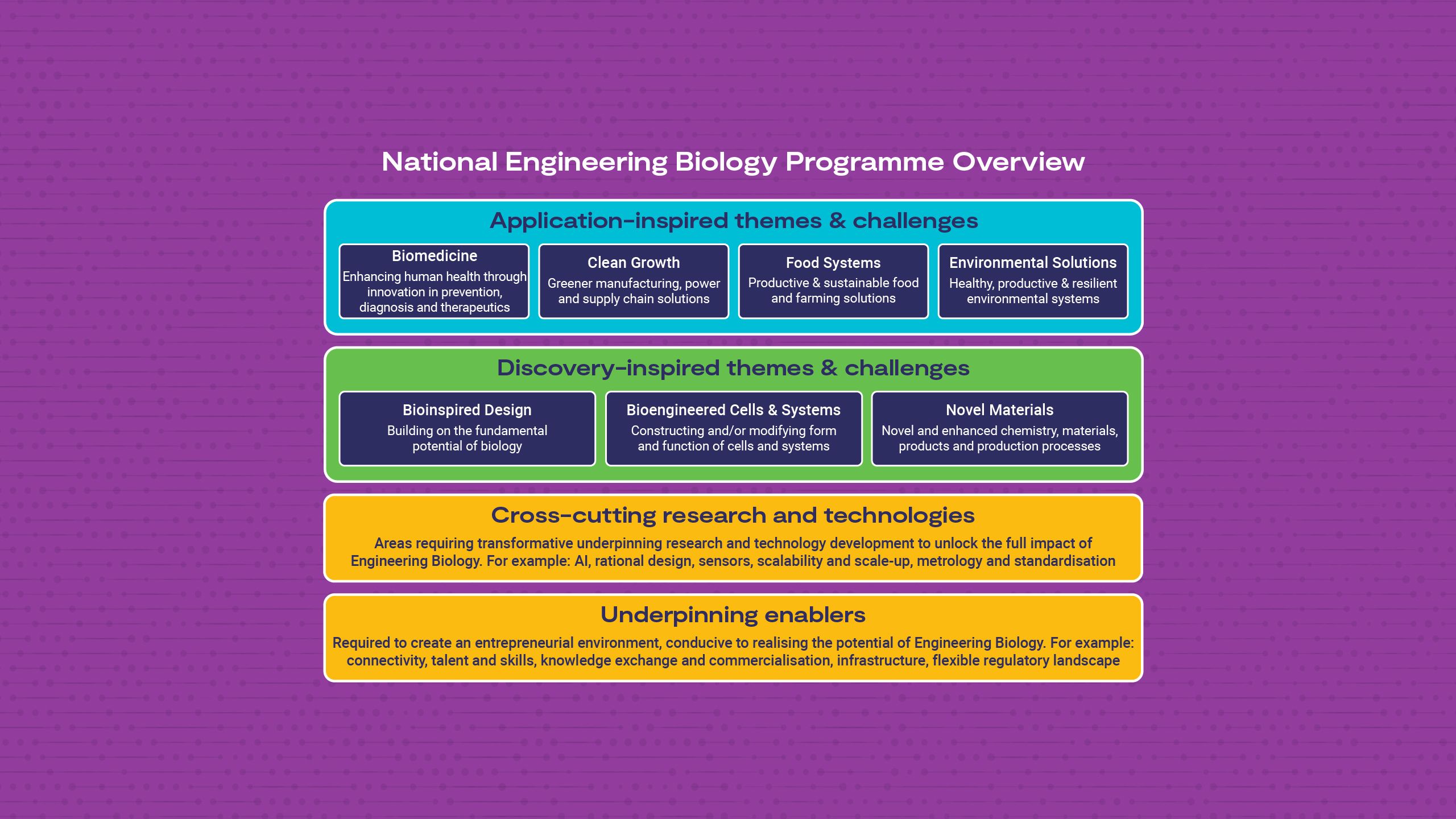


UKRI investment in synthetic biology and engineering biology

Since 2007, UKRI has invested over £800 million in synthetic and engineering biology in the UK, which has driven the establishment and development of the field. This investment includes flagship programmes, such as the Synthetic Biology for Growth Programme and the recently announced Engineering Biology Mission hubs and awards.

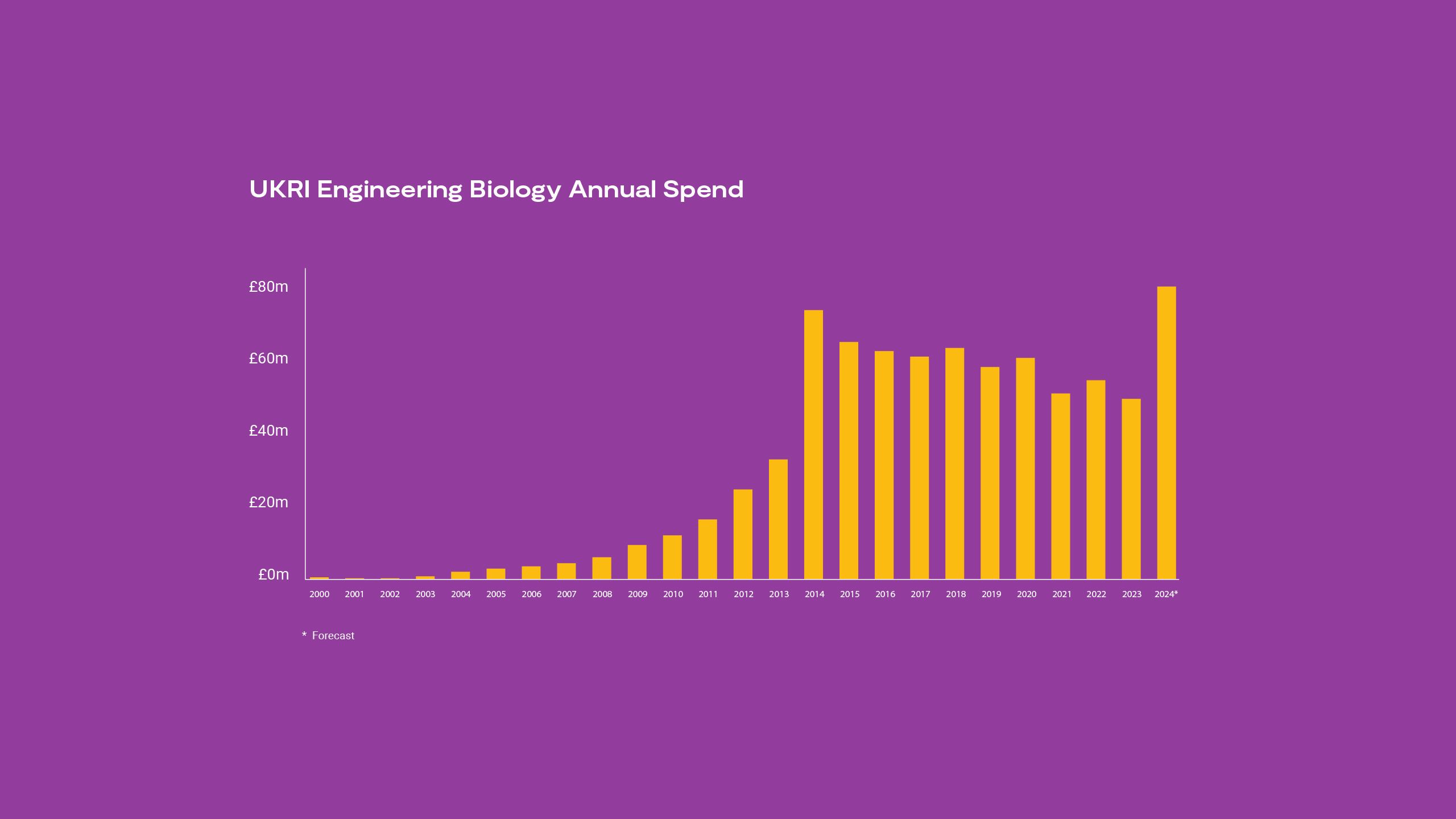


Flagship programmes




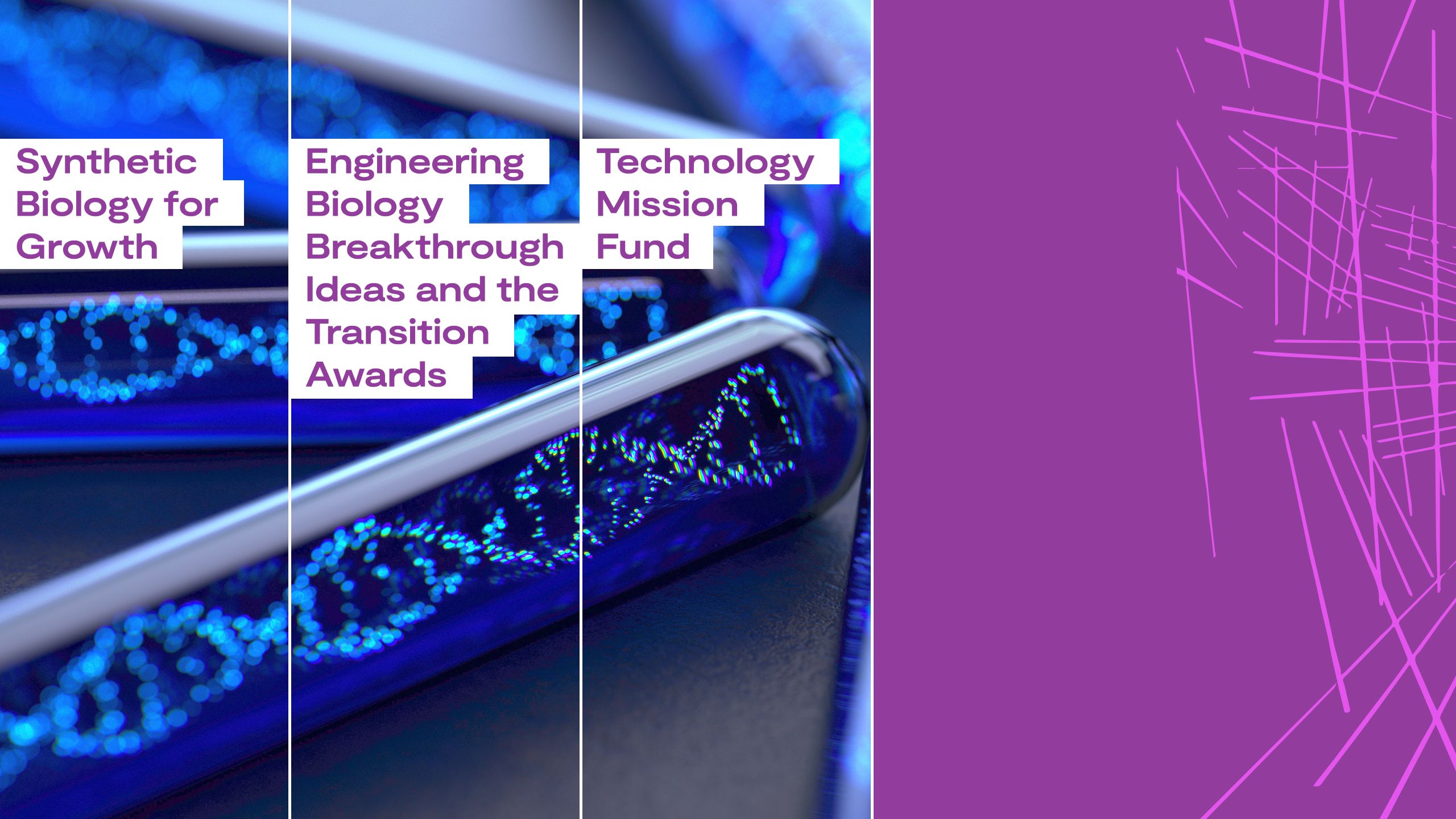
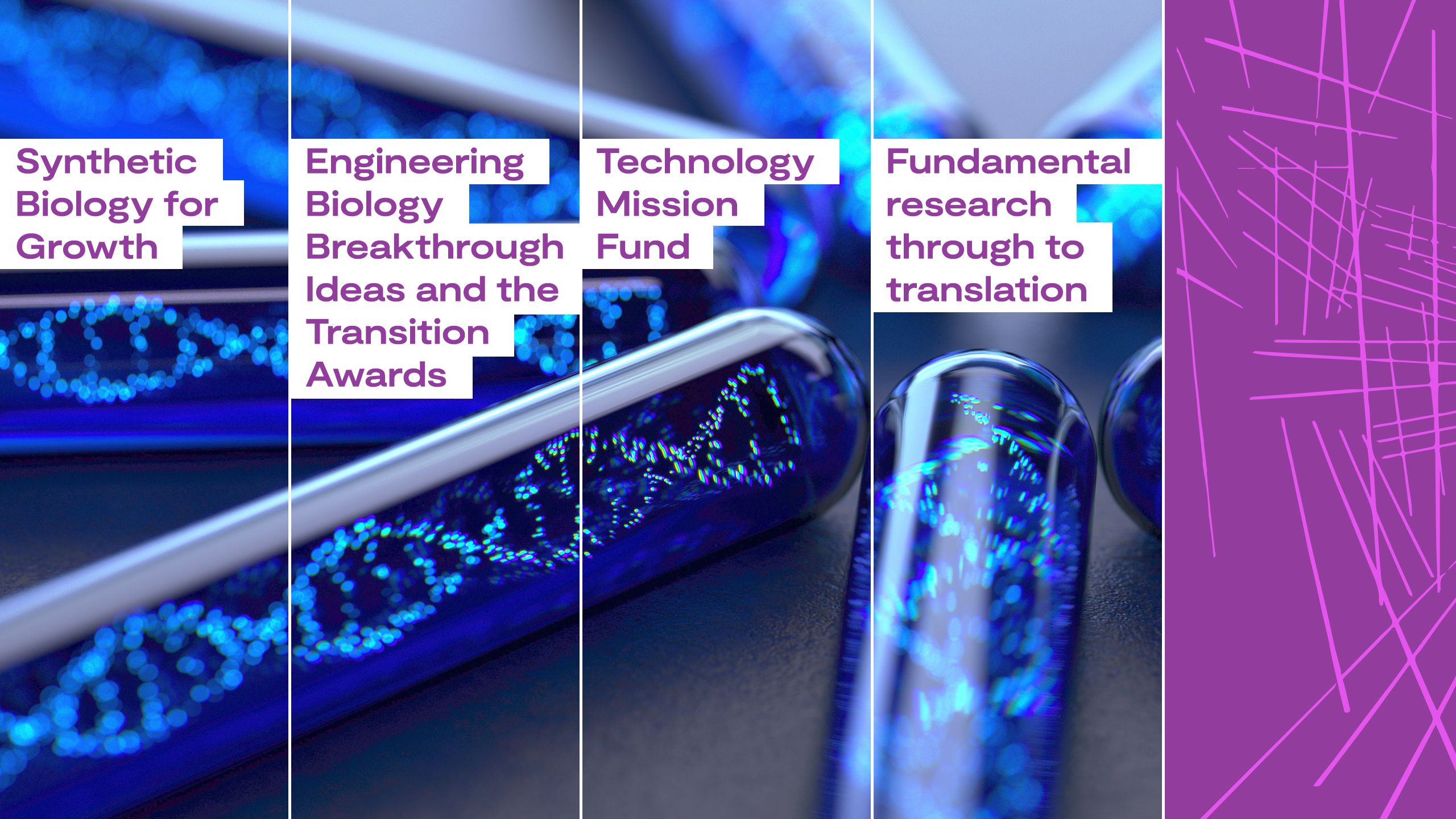
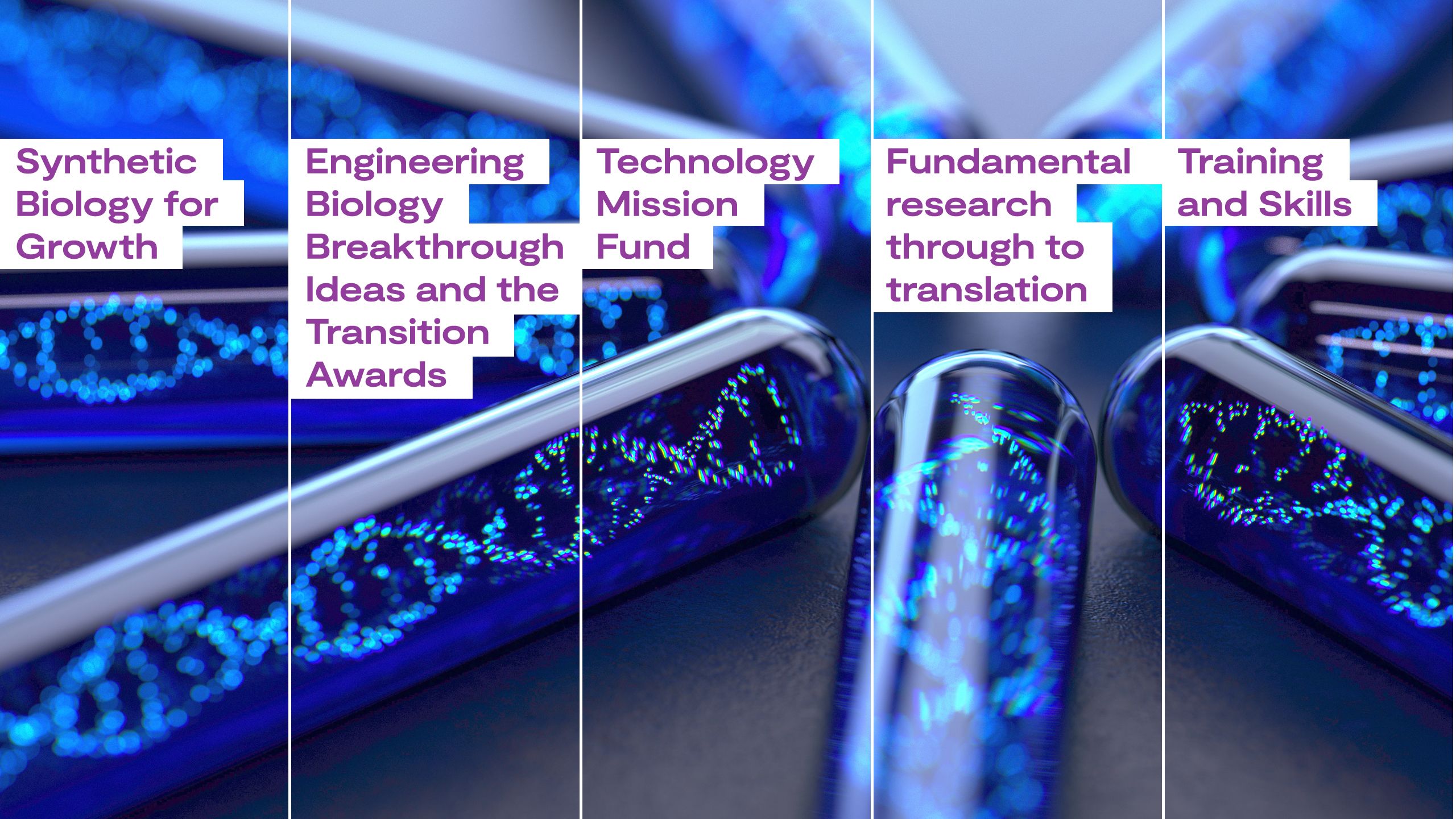






Synthetic Biology for Growth (SBfG)
The UK was an early proponent of synthetic biology, launching the £114 million Synthetic Biology for Growth (SBfG) programme in 2014. SBfG supported early-stage research that could aid future industrial activity and foster a strong, collaborative network of academic and industrial researchers across the UK.
SBfG encompassed:
- six Synthetic Biology Research Centres (SBRC): BrisSynBio (Bristol), OpenPlant (Cambridge and Norwich), SBRC Nottingham, SynBioChem (Manchester), SynthSys-Mammalian (Edinburgh), and WISB (Warwick)
- four foundries and two centres funded to provide DNA synthesis and DNA construct capability: Earlham Institute - Automated DNA Assembly (now called the Earlham Biofoundry), Edinburgh Genome Foundry, Liverpool GeneMill, London DNA Foundry, Synthetic Biology facility at the MRC Laboratory of Molecular Biology (Cambridge), and Next Generation DNA Synthesis (Oxford, Liverpool, Bristol, Southampton, and Birmingham)
- additional equipment support for two Centres for Doctoral Training (CDT): CDT in Bioprocess Engineering Leadership (UCL) and Synthetic Biology CDT (Oxford, Bristol and Warwick)
- the Rainbow Seed Fund, which was allocated £10 million to invest in early-stage synthetic biology companies.
Engineering Biology Breakthrough Ideas and the Transition Awards
The Breakthrough Ideas opportunity was developed to secure a pipeline of new and novel ideas in engineering biology. This funding aimed to:
- seed the development of novel and high-risk ideas
- engage with new research communities
- foster greater multi- and interdisciplinary collaboration
A total of 23 awards were made across 15 UK lead institutions with a total of £2.25 million invested, including £550,000 co-funding from Dstl. The awards started in January 2022.
The Transition Awards opportunity was developed to enable the continued growth of research communities and capacity across the UK towards establishing the proposed National Engineering Biology Programme.
This funding aimed to:
- support discovery and application-inspired research and innovation activities and community development
- maintain capability and capacity in the UK by establishing community collaborations to further develop activities
- build on existing expertise and fundamental research to drive impact through translation and commercial partnership
Twelve awards were made across 10 UK lead institutions, totalling £15 million in investment. The awards started in January 2022.
Engineering Biology Hubs: The Preventing Plastic Pollution with Engineering Biology (P3EB) Mission Hub. (3min 46secs)
Technology Missions Fund (TMF)
£125 million from the Technology Missions Fund (TMF) and core UKRI budget has supported an integrated suite of investments to drive technology development and uptake that address the four mission themes of the National Engineering Biology Programme (NEBP):
- Biomedicine
- Clean Growth
- Food Systems
- Environmental Solutions
This investment includes:
Mission Hubs in engineering biology (five years, £70 million total investment) that will act as centres of critical mass, skills development and expertise, securing the foundational activity while also driving research and innovation towards commercial impact and opportunity.
Mission Awards (two years, £30 million total investment) to enable the expansion of engineering biology disciplines and communities, building on existing strengths and emerging opportunities and encouraging engagement, diversity, and connectivity across and between disciplines and communities.
More details of the Mission Hubs and Awards
Collaborative Research and Development (18 months, £13.5 million), awarded by Innovate UK for 48 business-led collaborative R&D grants focused on industrial research that will lead to new engineering biology products, processes or services.
Seed Corn funding (two years, £4 million total) to support great science, answering urgent commercial needs and helping to build and grow sustainable businesses in engineering biology. This proven model aims to address a key market failure at the early-stage investment level, bridging the gap between public sector research and innovation investments and VC equity funding through a range of approaches.
Proof-of-Concept activity (two years, £3 million total) to deliver next-generation engineering biology projects that feed the innovation pipeline by trialling high-risk breakthrough ideas, fuelling game-changing research and innovation programmes, and underpinning economic growth.
Accelerator Feasibility Awards (two years, £2 million). Innovate UK has worked with Science Creates to deliver the Engineering Biology Accelerator, designed to support engineering biology researchers who wish to launch a company or whose existing startup is in the very early stages.
Fundamental research through to translation
Beyond these key programmes, existing funding mechanisms have supported engineering biology research, including responsive mode, Longer-Larger grants (LoLas) and our translational funding approaches such as the Follow-on-Fund (FoF). In 2019, the FoF Synthetic Biology Highlight allocated an additional £600,000 with the aim of accelerating the commercialisation and translation of the UK’s world-leading synthetic biology research into practical application. Five SynBio applications were funded, leveraging a total value of over £1.7 million from the highlight funds.
SynbiCITE was established as a synthetic biology accelerator in 2013 with an initial £10 million commitment from the Engineering and Physical Sciences Research Council (EPSRC), Biotechnology and Biological Sciences Research Council (BBSRC), and Innovate UK, with further support from its industrial and academic partners. Subsequently, SynbiCITE has secured phase 2 funding from EPSRC.
Based at Imperial College London, SynbiCITE is the Innovation and Knowledge Centre (IKC) for Synthetic Biology with the aim of accelerating and promoting the commercial exploitation of synthetic biology research and engineering biology applications.
In 2024, SynbiCITE was awarded £3 million as part of the Technology Mission Fund Engineering Biology Programme to deploy Proof-of-Concept awards to the UK engineering biology community. This Proof-of-Concept funding aims to support academic-led applied research and translation activities that will drive industry-academic collaborations and partnerships.
Training and Skills
Engineering Biology is a rapidly expanding, cross-disciplinary area, where doctoral training opportunities are essential to train the next generation of researchers capable of driving the field forward in the UK, providing national capacity and capability across both academia and industry.
Between 2014-2024, UKRI invested in four Engineering Biology Centres for Doctoral Training (CDTs) across the breadth of the BBSRC and EPSRC remit, with a total investment of around £26 million, supporting 207 studentships in the initial decade alone with many more to follow.
UKRI Engineering Biology Central Doctoral Programmes (2014-2024)
In 2014, UKRI funded two Engineering Biology Centres for Doctoral Training (CDT); the EPSRC-funded Bioprocess Engineering Leadership CDT (UCL) and the joint EPSRC and BBSRC-funded Synthetic Biology CDT (Oxford, Bristol and Warwick), which together trained a total of 139 doctoral students and partnered with companies across a variety of sectors (biotechnology, pharmaceuticals and instrumentation).
UKRI Engineering Biology Central Doctoral Programmes (2019-2027)
In 2019, ESPRC funded a CDT in Bio-design Engineering led by Imperial College London, with partners at the University of Manchester and UCL, with the aim to support 80-100 scientists and technologists. The CDT is at the forefront of research that will accelerate the clean growth agenda and the development of a resilient circular bioeconomy.
UKRI Engineering Biology Central Doctoral Programmes (2023-2032)
In 2023, an EPSRC and BBSRC co-funded Engineering Biology CDT was awarded to the University of Bristol and University of Oxford with a total investment of around £9 million. The vision of the CDT is to “train the academic and industrial leaders of tomorrow, and to equip them with the skills needed to contribute towards scalable, robust, and transformative engineering of biomimetic and biological systems.”
The EPSRC and BBSRC Centre for Doctoral Training in Engineering Biology builds on the success of the first UKRI-funded Synthetic Biology CDT (Oxford, Bristol and Warwick, 2014), which successfully trained 79 PhD students. The recently awarded Engineering Biology CDT will go towards addressing the National Engineering Biology Programme (NEBP) aspiration to train the next generation of biological engineers able to translate innovative, cutting-edge science into real-world impact, and support the EPSRC 'Frontiers in Engineering and Technology’ strategic focus area.
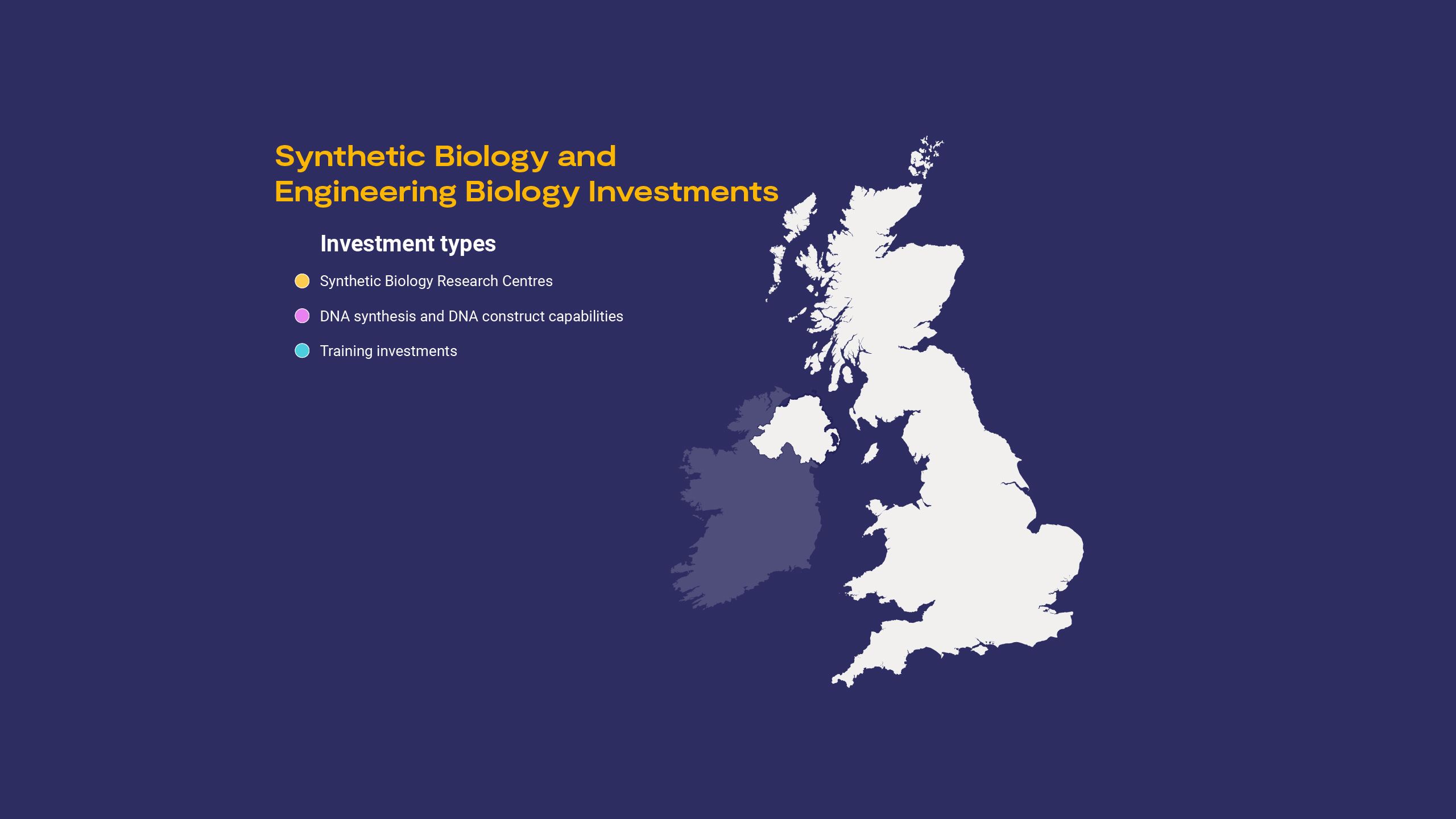
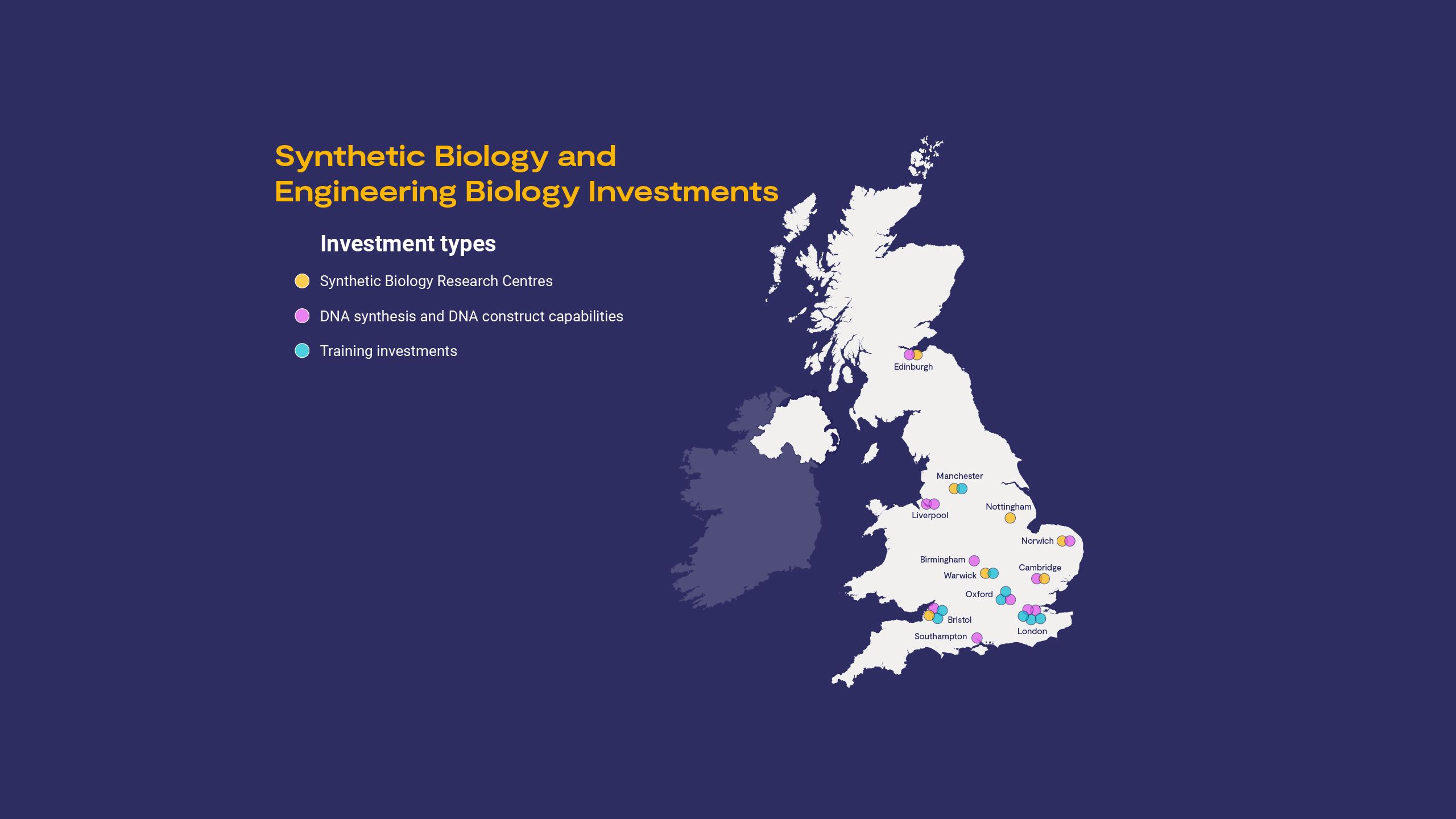
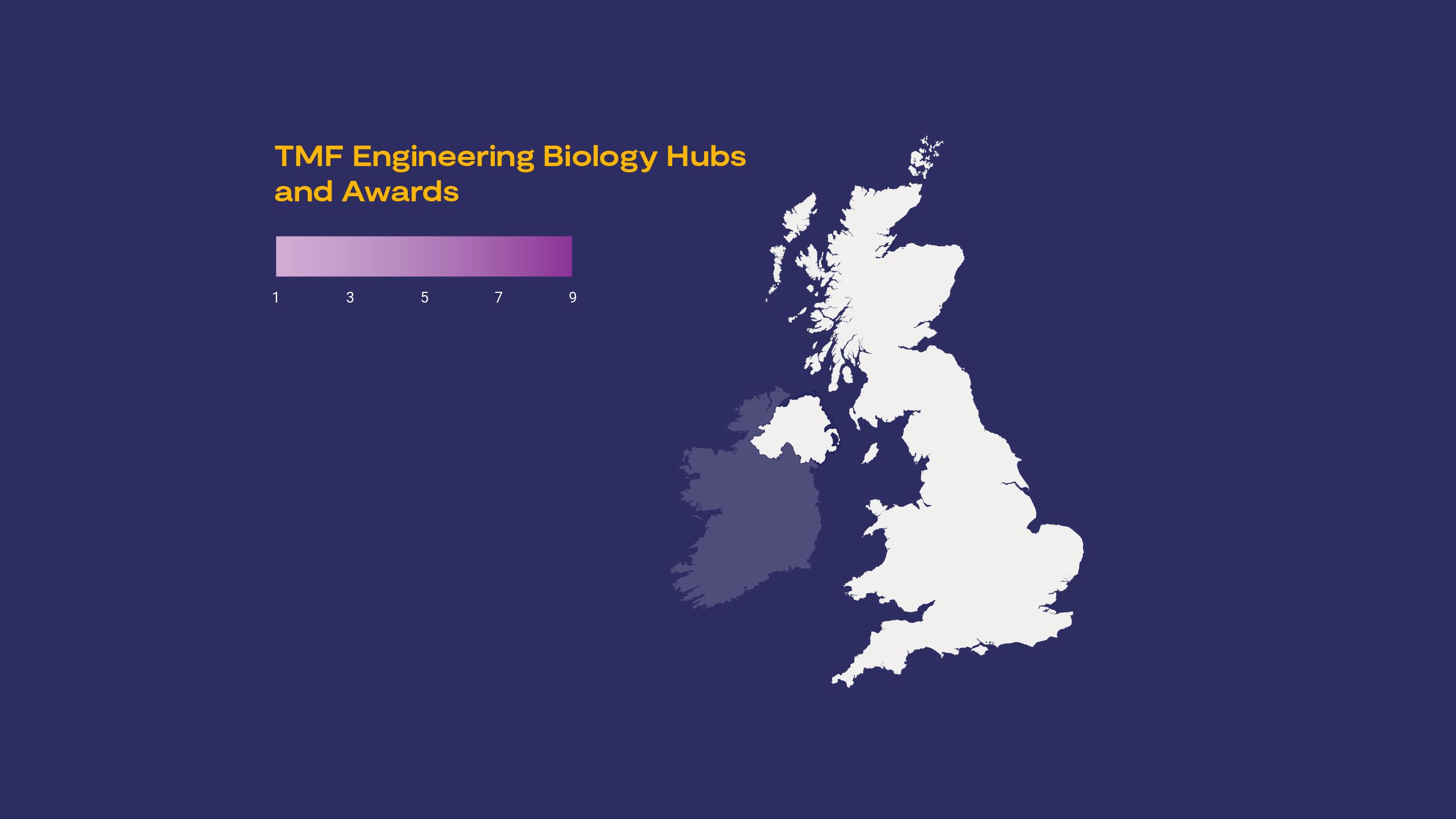
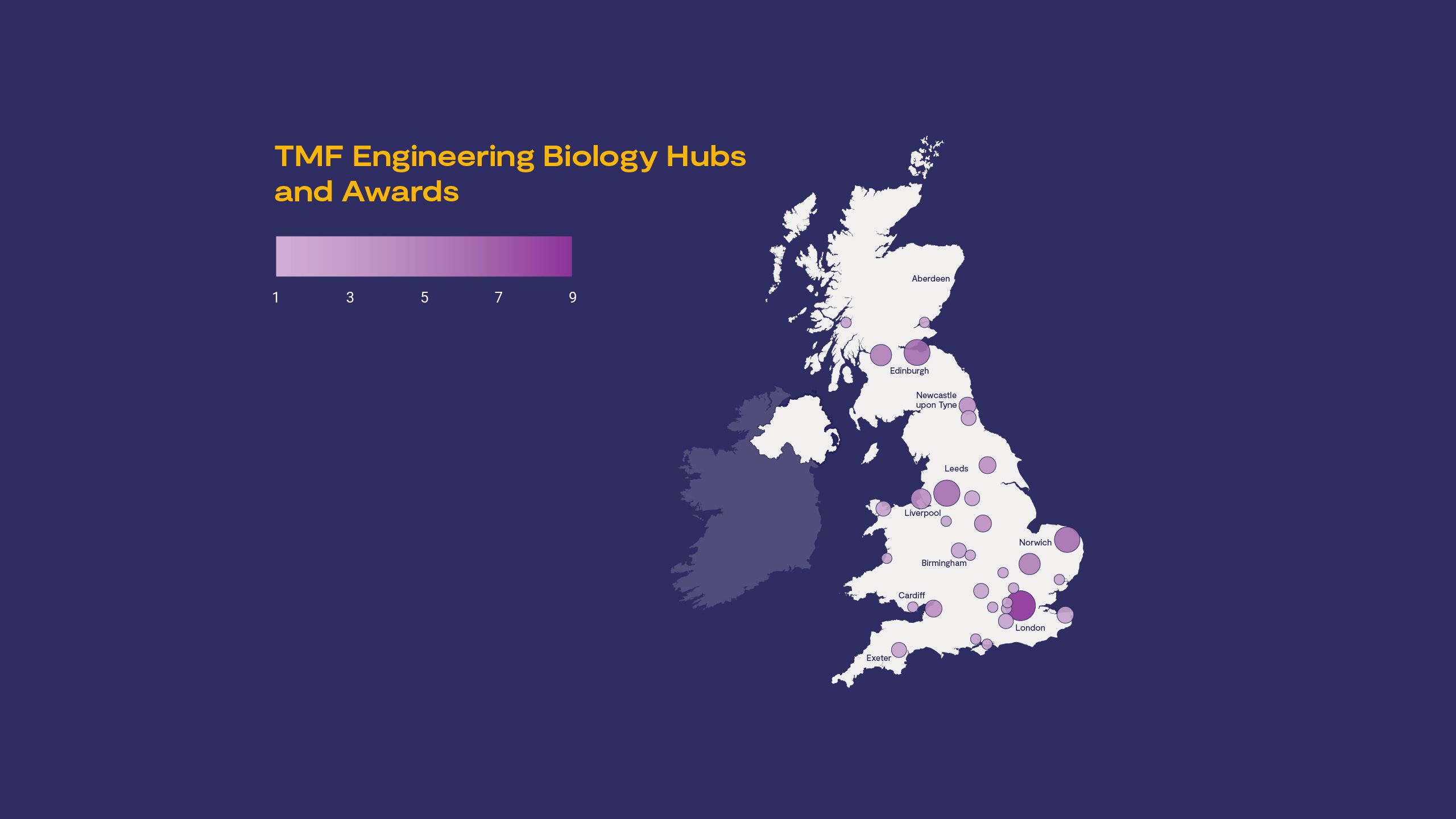




Meet the people behind the research


Case studies


About us

UK Research and Innovation (UKRI) is the largest public funder of research and innovation in the UK, investing £8 billion annually spanning all disciplines and all sectors. We are nine councils, drawing on our unique breadth and depth of expertise to work with government and other stakeholders to enrich lives, by increasing our understanding of ourselves and the world around us, supporting innovative businesses and public services, and creating high-quality jobs throughout the UK.
The UKRI Biotechnology and Biological Sciences Research Council (BBSRC) is the UK’s major public funder of bioscience research and innovation. Our aim is to further scientific knowledge, promote economic growth, wealth and job creation and improve quality of life in the UK and beyond.
BBSRC invested £461 million in world-class bioscience in 2023. We support research and training in universities and strategically supported institutes. The research, and the people we fund, are helping society address major challenges including food security, green energy and healthier, longer lives.
BBSRC leads UKRIs Engineering Biology programme. For more information please contact the Engineering Biology Team: Eng.Bio@bbsrc.ukri.org
BBSRC invests to push back the frontiers of biology and deliver a healthy, prosperous and sustainable future.
www.ukri.org/councils/bbsrc/
Get in touch with us to discuss BBSRC’s research outcomes and impacts or to tell us about your own:
Emma Lambourne
Senior Manager, Impact Evidence
emma.lambourne@bbsrc.ukri.org
Dr Beverley Thomas
Associate Director, Evidence and Evaluation
beverley.thomas@bbsrc.ukri.org
Dr Rosie Ford
Manager, Impact Evidence
rosie.ford@bbsrc.ukri.org








